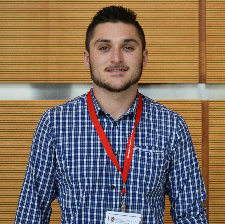Medical Physics Seminar – Monday, February 13, 2023
The Development of a Multi-Contrast Chest X-ray Radiography Prototype System for the Diagnosis of Lung Disease

Daniel Bushe
Graduate Research Assistant
Chest x-ray radiography (CXR) is extensively used in the diagnosis of respiratory conditions including COVID-19, chronic obstructive pulmonary disease (COPD), pneumothorax, diffuse parenchymal lung disease (DPLD) and other forms of viral and non-viral pneumonia. Despite the modality's widespread availability, there exist major limitations that inhibit the diagnostic performance of CXR. Primarily, the underlying physiological changes associated with the early manifestation of pulmonary disorders do not generate adequate image contrast to enable diagnosis with conventional CXR imaging. This work investigates the development of a novel multi-contrast CXR (MC-CXR) prototype imaging system to overcome the limitations of conventional x-ray absorption radiography. By exploiting the refraction and small angle scattering of x-rays, MC-CXR imaging simultaneously generates the conventional absorption contrast, x-ray phase contrast, and x-ray dark field contrast. The complementary information provided by these three contrast mechanisms can be leveraged to improve the detection of pulmonary abnormalities in their early manifestation. The purpose of this work is to report on the design, construction, optimization and evaluation of the aforementioned prototype system.
Improving the Efficacy of Functional Lung Avoidance Radiotherapy

Eric Wallat
Graduate Research Assistant
Functional avoidance radiotherapy (RT) has mainly focused on the direct results of irradiating healthy, normal lung tissue. Few studies have been published on the indirect effects of irradiating other important structures such as airways and vasculature, and their role in ventilation post-RT. Consequently, the combination of direct and indirect ventilation damage has not been used to determine post-RT function nor used to guide functional avoidance treatment plans. There are some ongoing prospective clinical trials that are investigating the safety (NCT02528942, NCT02308709) and efficacy (NCT02843568) of functional avoidance RT, but all fail to use an accurate, comprehensive dose-response model or apply the functional information to treatment plans in a non-discrete way.
This work investigates the impact of dose to airway structures on ventilation and develops a deep learning-based comprehensive dose-response model to accurately predict post-RT ventilation changes due to RT by incorporating ventilation damage due to direct and indirect effects. This work will also improve the way in which functional information is incorporated into the treatment planning process by developing a novel optimization algorithm to maximize lung function sparing.